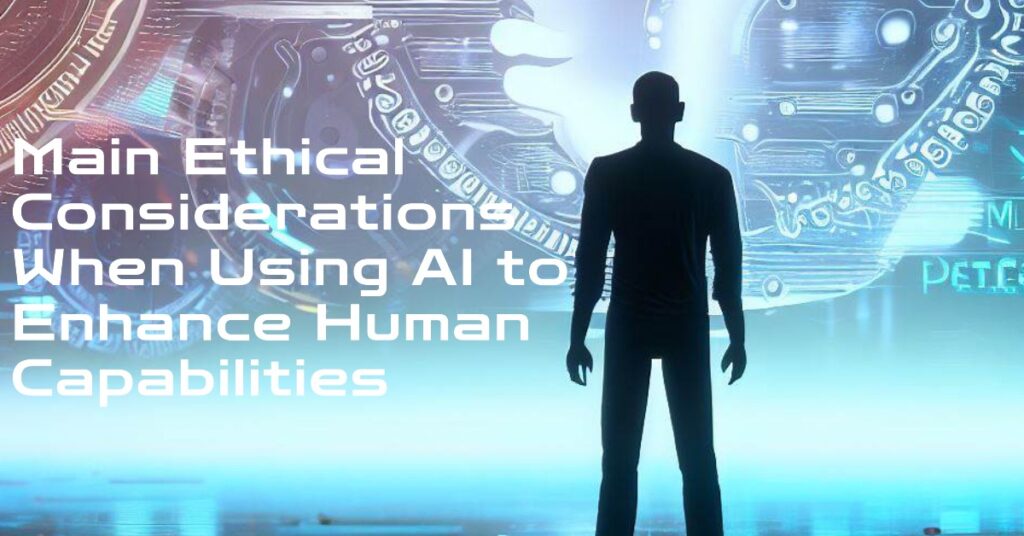The Main Ethical Considerations When Using AI to Enhance Human Capabilities
Artificial Intelligence (AI) has become a powerful tool in today’s world, revolutionizing various industries and enhancing human capabilities in unprecedented ways. From healthcare to education, AI has the potential to bring about significant advancements. However, with this power comes a set of ethical considerations that need to be carefully addressed. In this article, we will explore the main ethical considerations when using AI to enhance human capabilities, shedding light on the importance of responsible and ethical AI implementation.
Keep It Transparent

Transparency is a fundamental aspect when integrating AI into human capabilities. It is crucial to ensure that AI systems are transparent and explainable. In many cases, AI algorithms make decisions that impact individuals’ lives, such as determining credit scores or job applications. Therefore, it is essential to provide clear explanations on how these decisions are reached. A lack of transparency can lead to biases and unfair outcomes, potentially reinforcing existing societal inequalities. By keeping AI transparent, we can build trust among users and promote fairness in the system.
Involve Stakeholders
In the development and deployment of AI systems, it is vital to involve a diverse set of stakeholders. These stakeholders can include ethicists, legal experts, policymakers, and representatives from various communities that may be affected by the AI technology. By involving different perspectives, we can ensure that AI is designed and implemented in a way that respects societal values and avoids unintended consequences. Engaging stakeholders fosters a collaborative approach that takes into account the ethical implications of AI and ensures that the technology benefits everyone.
Safeguard Privacy and Data Security
AI relies on vast amounts of data to learn and make accurate predictions. However, this data often contains sensitive and personal information. As such, it is crucial to safeguard privacy and data security when using AI to enhance human capabilities. Organizations must adhere to robust data protection policies and practices, ensuring that personal data is handled securely and used only for legitimate purposes. Moreover, users should have control over their data and be informed about how their information is being utilized. Respecting privacy and data security is essential to maintain the trust of individuals and avoid potential misuse of sensitive information.
Avoid Bias and Discrimination
One of the most critical ethical considerations when using AI is addressing biases and discrimination. AI systems are trained on historical data, which may reflect societal biases and inequalities. If these biases are not recognized and addressed, AI can perpetuate discrimination and reinforce existing disparities. To mitigate this, it is essential to carefully design and test AI algorithms to identify and eliminate biased decision-making. The training data should be diverse and representative, reflecting the needs and perspectives of different groups. By actively working to eliminate bias, we can ensure that AI enhances human capabilities in an equitable and inclusive manner.
Ensure Accountability and Regulation
As AI continues to advance, it is crucial to establish accountability and regulatory frameworks. Clear guidelines and regulations need to be in place to govern the use of AI in enhancing human capabilities. This includes addressing issues related to liability, responsibility, and potential risks associated with AI systems. Regulatory bodies can play a significant role in overseeing AI technologies, ensuring compliance with ethical standards and preventing misuse. By implementing accountability and regulation, we can create a robust framework that promotes the responsible and ethical use of AI.
Looking Ahead

AI has the potential to revolutionize the way we enhance human capabilities, but it is essential to consider the ethical implications that come along with it. Transparency, stakeholder involvement, privacy, bias mitigation, and accountability are key aspects that need to be addressed when utilizing AI. By adhering to ethical considerations and implementing responsible AI practices, we can harness the power of AI to enhance human capabilities in a way that is fair, inclusive, and beneficial for all. As we continue to embrace AI, let us remember the importance of upholding ethical principles. By prioritizing transparency, involving stakeholders, safeguarding privacy and data security, mitigating bias, and ensuring accountability and regulation, we can navigate the ethical landscape of AI with integrity and responsibility.
Ultimately, the successful integration of AI into human capabilities relies on our ability to address these ethical considerations. It requires collaboration among researchers, developers, policymakers, and society as a whole. Together, we can shape the future of AI in a way that respects human values, promotes fairness, and maximizes the benefits for individuals and communities.
AI has the potential to enhance human capabilities in remarkable ways. However, we must tread carefully and responsibly, keeping ethics at the forefront of AI development and implementation. By embracing the principles of transparency, stakeholder involvement, privacy protection, bias mitigation, and accountability, we can ensure that AI is a force for good, empowering individuals while maintaining societal values. Let us harness the power of AI while upholding the ethical considerations that will shape a brighter and more inclusive future for humanity.

C M, a seasoned editor, journalist, and consultant, is deeply fascinated by the convergence of technology, space, and the future of humanity.
With a particular interest in transhumanism, futurology, and the philosophical and ethical dimensions of these domains, C M serves as the lead contributor to TranscendSphere and SpaceSpotlight.
When not penning insightful articles on these rapidly evolving fields, C M indulges in their love for podcasts and books, proudly embracing their status as a ‘Happy Nerd Extraordinaire!’





